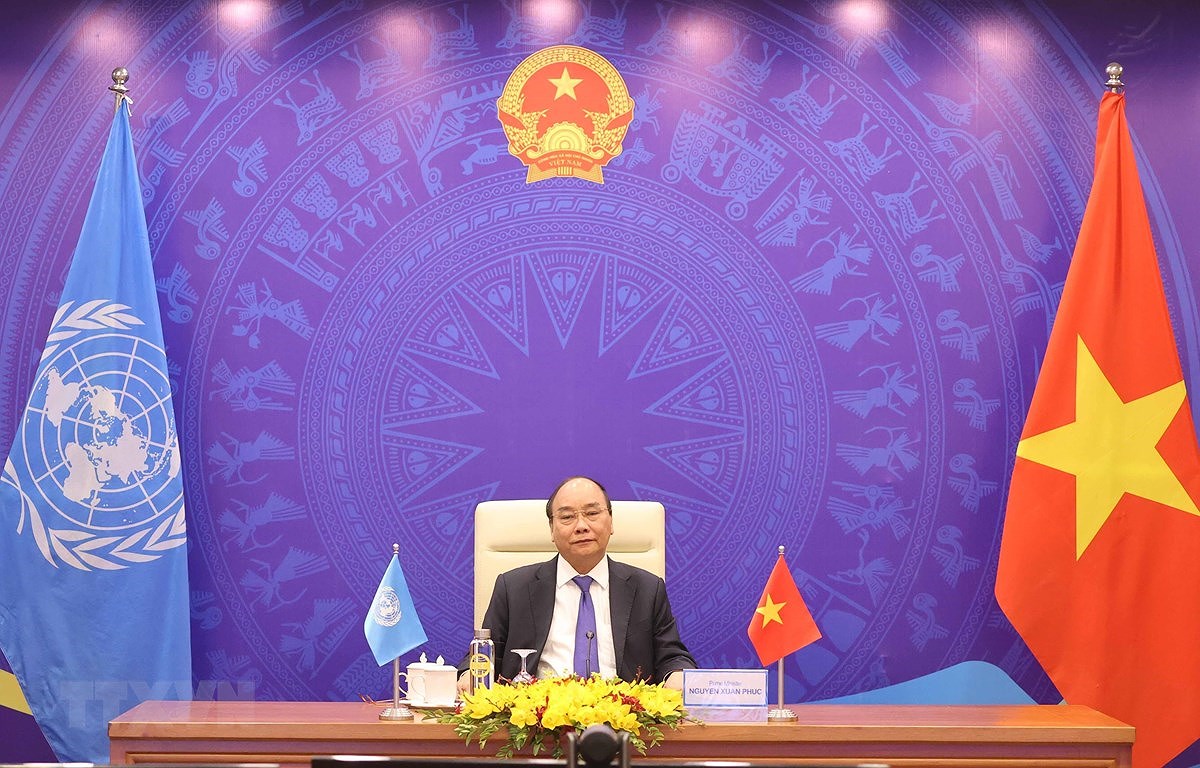Prime Minister Nguyen Xuan Phuc attended and delivered remarks at an open debate of the UN Security Council (UNSC) on addressing climate-related risks to international peace and security, which was held in the form of video conferencing on February 23.

Prime Minister Nguyen Xuan Phuc addresses the UNSC debate from Hanoi (Photo: VNA)
Hanoi, (VNA) – Prime Minister Nguyen Xuan Phuc
attended and delivered remarks at an open debate of the UN Security Council
(UNSC) on addressing climate-related risks to international peace and security,
which was held in the form of video conferencing on February 23.
This is the first time the Vietnamese government leader has
attended and spoke at an event in the framework of the UNSC, which demonstrates
Vietnam’s responsible role and contribution to the joint effort of the
international community to respond to climate change, a leading global challenge
at present.
In his remarks, PM Phuc underlined the grievous impacts of climate change on Earth – the shared
home of human kind, which have placed great burdens on
the political and socio-economic life of many countries. They have caused
unemployment and poverty, affected the livelihood of hundreds of millions of
people, and risked creating instabilities or exacerbating present conflicts in
many countries and regions, thus threatening international peace and security.
He proposed that the UNSC, with its foremost
mission being the maintenance of international peace and security, needs to
galvanize collective and persevering efforts of the international community via
four groups of measures to address climate-related risks.
PM Phuc said a comprehensive and balanced approach is necessary in
handling the connections between traditional and non-traditional security
challenges, particularly in addressing the root causes of conflicts, such as
poverty, inequality, power politics and unilateral interference and coercion. “Strict
adherence to the UN Charter and international law must truly become a standard
of behaviour for countries in international relations,” he said.
The Vietnamese government
leader asked the UNSC and the international community to allocate
greater resources to support developing countries, least developed countries,
small island developing states, and land-locked countries that are most
detrimentally affected by climate change, and are also lacking expertise and
resources, in order for the 2030 Agenda for Sustainable Development (SDG-2030),
the UN Framework Convention on Climate Change (UNFCCC), and the Paris Agreement
(COP-21) to be effectively implemented.
He hoped that the UNSC will continue to enhance its early warning capacity,
and bolster its role in mediating, preventing and resolving conflicts in all
regions, including through enhancing cooperation with regional organizations.
At the same time, PM Phuc stressed that in order to harmoniously manage
the connection between climate change and security, it is necessary to continue
upholding the principles of respect for the sovereignty, national ownership and
principal responsibilities of states.
“The shared interests of communities and peoples, particularly
vulnerable groups, must be placed at the heart of all national and global climate
action strategies and plans,” he said.
PM Phuc took the occasion to affirm that active
and effective response to climate change is both a major guideline and a strong
political resolve by the Vietnamese Government. He stressed that Vietnam has
made great efforts to fulfill its international commitments on climate change
(SDG-2030 and COP-21).
“In this connection, we support all endeavours to address
climate-related challenges at the UNSC and other multilateral forums,” the PM
said, pledging that Vietnam will work closely with other ASEAN members and
support the cooperation between ASEAN and the UN.
Climate change-related risks to international peace and security is
an issue drawing great attention at the UNSC. Since 2007, the UNSC has organized
nine debates on the issue, with a statement of the council’s President adopted
in 2011 on climate change’s impact on maintenance of peace and security./.